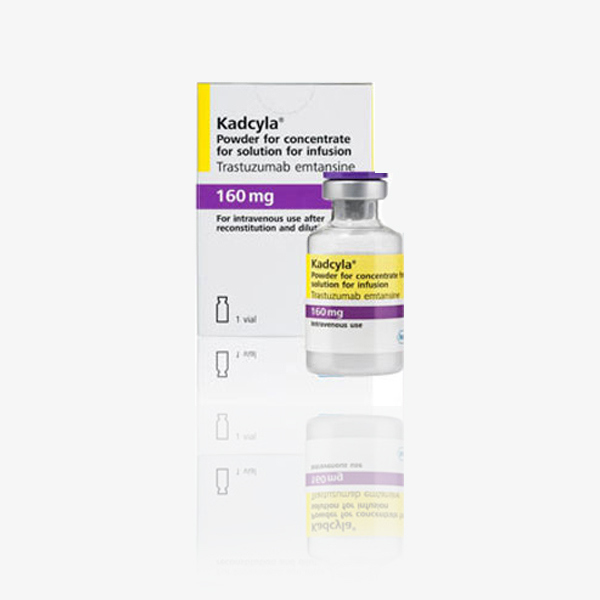Buy Kadcyla : Trastuzumab Emtansine 160 Mg Injection Online
$1,983.93
Brand Name : Kadcyla
Composition : Trastuzumab Emtansine
Manufactured by : Roche Holding AG
Strength : 160 mg
Form : Injection
Packing : Pack of 1 Vial
Prescription Required *
Kadcyla, also known as Trastuzumab Emtansine 160 Mg Injection, is a medication used to treat breast cancer that has spread to other parts of the body and has a protein called human epidermal growth factor receptor 2 (HER2) on the surface of the cancer cells. Kadcyla is a combination of two drugs: trastuzumab, which targets the HER2 protein, and emtansine, which kills cancer cells.
The recommended dosage of Kadcyla is 3.6 mg/kg administered intravenously once every three weeks. Treatment may continue until the disease progresses or unacceptable toxicity occurs. Dose adjustments may be necessary based on the patient’s individual response and any side effects that may occur.
Common side effects of Kadcyla include nausea, fatigue, muscle and joint pain, headache, and low platelet count. More serious side effects may occur, including liver problems, heart problems, lung problems, and nerve damage. Patients should report any side effects to their healthcare provider immediately.
Before starting Kadcyla, patients should inform their healthcare provider of any allergies, medical conditions, and medications they are currently taking. Kadcyla should not be used by patients who are pregnant or breastfeeding, as it may harm the developing fetus or newborn.
Kadcyla may interact with other medications, so patients should inform their healthcare provider of any medications they are taking, including over-the-counter medications and supplements. Patients should also avoid live vaccines while taking Kadcyla.
Regular appointments with a healthcare provider are important to monitor the patient’s response to treatment and any side effects that may occur. Kadcyla is typically administered in a clinical setting by a qualified healthcare professional.
In conclusion, Kadcyla (Trastuzumab Emtansine 160 Mg Injection) is a medication used to treat breast cancer that has spread to other parts of the body and has the HER2 protein on the surface of the cancer cells. Patients should inform their healthcare provider of any allergies, medical conditions, and medications they are currently taking. Regular appointments with a healthcare provider are important to monitor the patient’s response to treatment and any side effects that may occur.
Be the first to review “Buy Kadcyla : Trastuzumab Emtansine 160 Mg Injection Online” Cancel reply
Related products
Anti Cancer
Anti Cancer
Anti Cancer
Anti Cancer
Anti Cancer













Reviews
There are no reviews yet.